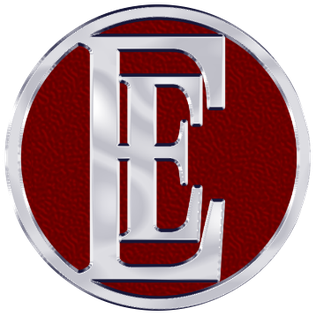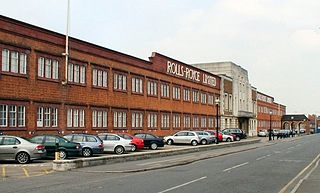Related Research Articles

The English Electric Company Limited (EE) was a British industrial manufacturer formed after the armistice ending the fighting of World War I by amalgamating five businesses which, during the war, had been making munitions, armaments and aeroplanes.
GKN Ltd is a British multinational automotive and aerospace components business headquartered in Redditch, England. It is a long-running business known for many decades as Guest, Keen and Nettlefolds. It can trace its origins back to 1759 and the birth of the Industrial Revolution.

Jensen Motors Limited was a British manufacturer of sports cars and commercial vehicles in West Bromwich, England. Brothers Alan and Richard Jensen gave the new name, Jensen Motors Limited, to the commercial- and sports car body-making business of W J Smith & Sons Limited in 1934. It ceased trading in 1976. Though trading would resume in 1998, Jensen Motors Limited was dissolved in 2011.
Hardy Spicer is a brand of automotive transmission or driveline equipment best known for its mechanical constant velocity universal joint originally manufactured in Britain by Hardy employing patents belonging to US-based Spicer Manufacturing. Hardy and Spicer soon became partners. Later Spicer became Dana Holding Corporation.

Karrier was a British marque of motorised municipal appliances and light commercial vehicles and trolley buses manufactured at Karrier Works, Huddersfield, West Yorkshire, by Clayton and Co. (Huddersfield) Limited. They began making Karrier motor vehicles in 1908 in Queen Street South, Huddersfield. In 1920, H.F. Clayton sold Clayton and Co's Huddersfield business into public listed company Karrier Motors while keeping their Penistone operation separate. Mechanical and electrical engineers Clayton & Co Penistone, remain active in 2020 as Clayton Penistone Group.

Cravens Railway Carriage and Wagon Company Limited was a railway rolling stock builder in the Darnall district of Sheffield, England. Founded by brothers named Craven and known as Craven Brothers, later Cravens Limited, it remained a family business until John Brown & Company acquired a controlling shareholding in 1919. Its name was changed back to Cravens Limited in 1954 when it finally became a wholly owned subsidiary of John Brown.

Pressed Steel Company Limited was a British car body manufacturing business founded at Cowley near Oxford in 1926 as a joint venture between William Morris, Budd Corporation of Philadelphia USA, which held the controlling interest, and a British / American bank J. Henry Schroder & Co. At that time the company was named The Pressed Steel Company of Great Britain Limited. It acquired Budd's patent rights and processes for use in the United Kingdom. Morris transferred his interest to his company, Morris Motors Limited.

Rolls-Royce Limited was a British luxury car and later an aero-engine manufacturing business established in 1904 in Manchester by the partnership of Charles Rolls and Henry Royce. Building on Royce's good reputation established with his cranes, they quickly developed a reputation for superior engineering by manufacturing the "best car in the world". The business was incorporated as "Rolls-Royce Limited" in 1906, and a new factory in Derby was opened in 1908. The First World War brought the company into manufacturing aero-engines. Joint development of jet engines began in 1940, and they entered production in 1944. Rolls-Royce has since built an enduring reputation for the development and manufacturing of engines for military and commercial aircraft.
Vickers Limited was a British engineering conglomerate. The business began in Sheffield in 1828 as a steel foundry and became known for its church bells, going on to make shafts and propellers for ships, armour plate and then artillery. Entire large ships, cars, tanks and torpedoes followed. Airships and aircraft were added, and Vickers jet airliners were to remain in production until 1965.

Coventry Ordnance Works was a British manufacturer of heavy guns particularly naval artillery jointly owned by Cammell Laird & Co of Sheffield and Birkenhead, Fairfield Shipbuilding and Engineering Company of Govan, Glasgow and John Brown & Company of Clydebank and Sheffield. Its core operations were from a 60-acre site in Stoney Stanton Road in the English city of Coventry, Warwickshire.

Humber is an English brand of bicycle. Thomas Humber made himself a velocipede in 1868. From that time he built a substantial business in manufacturing tricycles and bicycles while continuously improving their design and construction. His products were so well-made and well-designed they were known as "the aristocrat among bicycles".

Hadfields Limited of Hecla and East Hecla Sheffield, Yorkshire was a British manufacturer of special steels in particular manganese alloys and the manufacture of steel castings.

A. Darracq and Company Limited was a French manufacturer of motor vehicles and aero engines in Suresnes, near Paris. The French enterprise, known at first as A. Darracq et Cie, was founded in 1896 by Alexandre Darracq after he sold his Gladiator Bicycle business. In 1902, it took effect in 1903, he sold his new business to a privately held English company named A Darracq and Company Limited, taking a substantial shareholding and a directorship himself.

GKN Automotive is a multinational manufacturer of driveline components, all-wheel drive systems and plug-in hybrid systems for the automotive industry.

Ransome & Marles Bearing Company Limited was the owner of a business making ball and roller bearings founded during the First World War to make bearings for aircraft and other engines. Before the war most bearings had been imported and most of those were from Germany.
The Provincial Tramways Company was a holding company for horse tramway companies in various regional towns of England. It was floated in July 1872 by means of a prospectus inviting public subscription for shares in the new company. The published prospectus lists the towns where it was proposed to operate horse tramways as Plymouth. Cardiff, Dundee. Portsmouth. Southampton and Tynemouth. Initially those in Plymouth and Cardiff were constructed and in operation as reported to the half yearly meeting of the company in 1873.
Peter Hooker Limited owned an engineering business originally established in 1827 and carried on under the name Messrs Peter Hooker as printers' engineers at 12 Pump Row, Old Street Road, St Luke's, later at Pear Tree Court, Farringdon Road, London EC. The limited liability company was formed to own it in 1900. Operations were moved to Black Horse Lane Walthamstow, Essex, in 1901.

Thos. W. Ward Ltd was a Sheffield, Yorkshire, steel, engineering and cement business, which began as coal and coke merchants. It expanded into recycling metal for Sheffield's steel industry, and then the supply and manufacture of machinery.

Peter Brotherhood (1838–1902) was an English engineer. He invented the Brotherhood engine used for torpedoes as well as many other engineering products.
Darracq Motor Engineering Company Limited was a London importer, retailer and wholesaler of French-made Darracq and Talbot automobiles, a coachbuilder making regular production runs of bodies for S T D group products and a property holding company on behalf of its parent S T D Motors Limited.
References
- 1 2 W. S. Laycock, Limited. The Times, Monday, 26 May 1919; pg. 21; Issue 42109
- 1 2 Law Notices, 5 May. The Times, Monday, 5 May 1924; pg. 5; Issue 43643
- ↑ The Laycock Engineering Company, Limited. The Times, Wednesday, 8 January 1936; pg. 16; Issue 47266.
- ↑ "International Sense Behind £22M. Birfield Bid." The Times, 10 June 1966; pg. 19; Issue 56654.
- 1 2 Birfield Accept. The Times, Friday, 5 August 1966; pg. 17; Issue 56702
- ↑ To The Editor Of The Times.. W. S. Laycock. The Times, Friday, 1 June 1900; pg. 13; Issue 36157
- ↑ Railway Carriage Warming. The Times, Friday, 17 February 1893; pg. 15; Issue 33877
- ↑ New Train To Brighton. The Times, Monday, 2 November 1908; pg. 3; Issue 38793
- ↑ The Birfield Group Of Companies. The Times, Tuesday, 13 October 1964; pg. 9; Issue 56141
- ↑ page 3, Sheffield Daily Telegraph, 19 January 1889
- ↑ The British Trade Journal and Export World, January 1885, Spottiswoode, London
- ↑ Marian Suman-Hreblay, Automobile Manufacturers Worldwide Registry, McFarland, 2000 ISBN 9780786409723
- 1 2 3 The Laycock Engineering Company, Limited. The Times, Wednesday, 8 January 1936; pg. 16; Issue 47266.
- ↑ Engineering Transfer. The Times, Monday, 23 December 1935; pg. 20; Issue 47254
- ↑ Engineering Merger. The Times, Friday, 23 December 1938; pg. 17; Issue 48185
- ↑ Mr Herbert Hill. The Times, Tuesday, 7 July 1987; pg. 14; Issue 62814.